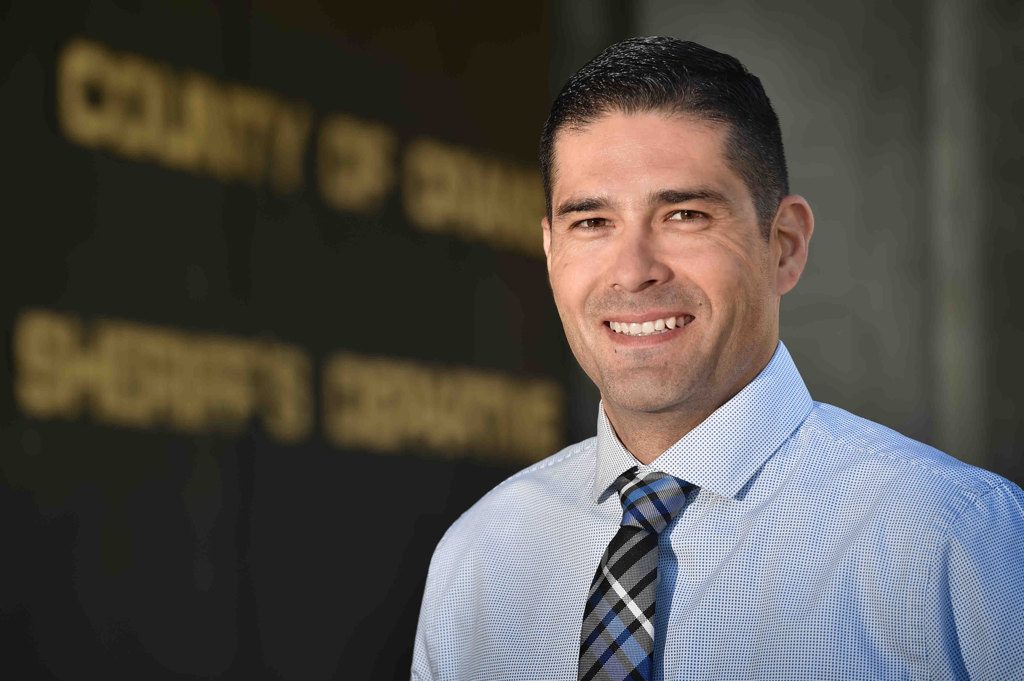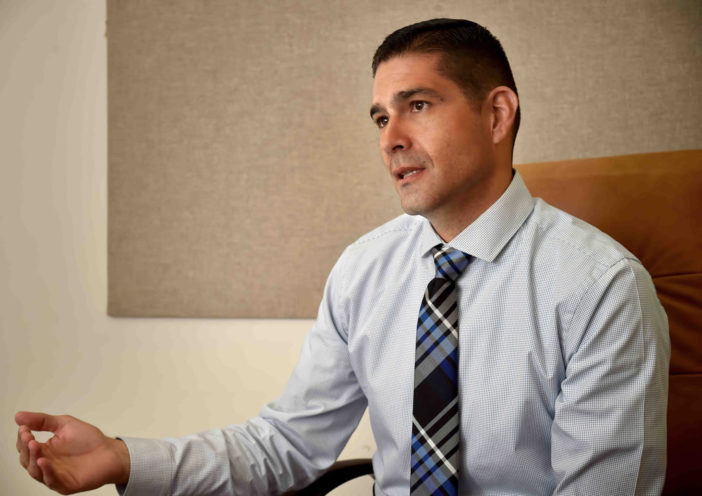As an investigator on the Orange County Sheriff’s Department’s Special Victims Detail, Edoardo Arredondo has to separate his personal feelings from the ugly allegations of every case that comes across his desk:
An adult is accused of molesting a teenager of a friend.
A 10-year-old girl reports her biological father is molesting her.
A youth pastor is accused of sexually assaulting minors at his church.
These are among the toughest of criminal cases to tackle, and definitely not for all investigators.
But Arredondo, who has five children ages 2 to 13, is one of the OCSD’s most adept at investigating and solving such crimes, in many cases eliciting confessions that help lead to convictions and lengthy prison sentences for some of society’s most repugnant offenders.
The above three examples were recent cases in which Arredondo was the lead investigator.
In January, the KinderVision Foundation, a non-profit that seeks to protect youth from sexual exploitation, abduction and human trafficking, recognized Arredondo’s work.
“It was an honor, but…it’s about the team,” Arredondo said of his Greatest Save award. “It’s always about the team. I couldn’t do what I do without them.”
An OCSD deputy for 19 years, Arredondo, 41, has been on the Special Victims Detail for four years. Prior to that, he was an investigator on the Family Protection Detail for three years.
The OCSD’s Special Victims Detail investigates child molestations and sexual assaults and rapes of children and adults.
The Family Protection Detail tackles domestic violence cases and crimes involving physical abuse of children.
It’s very troubling stuff, and crimes that often permanently scar victims.
Putting together cases that lead to long prison sentences for the offenders makes it worth it for Arredondo and his colleagues on the Special Victims Detail, which is run by Sgt. Michael Tanabe.
Arredondo works with fellow investigators Naomi Hernandez, Karen Loddby, Christine Berryman, Theresa Bard, Alex Quilantan, Michael Laros and Lizeth Henriquez, along with Investigator Assistant Vianey Castro and Secretary Marylou Manzo.
“I enjoy my work, and I enjoy what we’re able to accomplish,” said Arredondo, referring to helping secure long prison sentences for convicted offenders.
Arredondo grew up in Hacienda Heights and comes from a law enforcement family. His father was a sergeant for the Los Angeles Sheriff’s Department, his sister is a retired LASD deputy, and his younger brother, Everardo, is a sergeant at the OCSD.
He always had his eyes on becoming an OCSD investigator after he began working in the jails after graduating from the academy and getting hired in 1999.

Investigator Edoardo Arredondo of the Orange County Sheriff’s Department won a Greatest Save award from the KinderVision Foundation.
Photo by Steven Georges/Behind the Badge OC
Arredondo worked North Patrol for a few years and then on a specialized plainclothes detail on Orange County Transit Authority trains and buses before promoting to investigator in 2011.
He says he loves being able to see cases progress from beginning to end — something investigators, unlike patrol deputies, are able to enjoy.
The youth pastor in the aforementioned case, which involved five victims, pled guilty and was sentenced to six years in state prison and must register as a sex offender for the rest of his life.
The father accused of molesting his biological 10-year-old daughter pled guilty and now is serving three years in state prison and will be required to register as a sex offender for the rest of his life.
The adult accused of molesting a teenager of a friend was extradited from Arizona to California and charged with eight counts of felony child molestation with a sentencing enhancement of committing lewd acts upon multiple victims. If convicted, he faces multiple life sentences in state prison.
Arredondo, whose wife, Hilda, is a high school administrator, says he goes into each investigation with an unbiased lens to find the truth.
If a minor comes forward with allegations of sexual abuse against a person living in the same home, Arredondo and his colleagues will pounce on the case since they do not want the alleged activity to continue.
“The hard thing with these cases is when you have a child stating they were violated, for the most part there’s no evidence, and you need to rely on a suspect’s confession to help build your case,” Arredondo said. “For example, I may have a 10-year-old boy come forward to say that six months ago, his uncle touched his penis. And that’s all I have.”
In such cases, Arredondo will attempt to extract a confession by having the victim contact the accused abuser by phone. With investigators listening in without the suspect’s knowledge, the victim will confront the accused about past offenses.
Often, a suspect will apologize or tell the victim such activity never will happen again. Such acknowledgments then become part of the evidence Arredondo uses to build a case.
Then it’s time for him to speak to the suspect.
In many cases, Arredondo will attempt to confront a suspect in a neutral, public setting — say, while the suspect is walking out of a grocery store. Dressed in street clothes, Arredondo will talk to the suspect calmly as opposed to hauling him down to OCSD headquarters and interrogating him in an interview room.
“We try to make them feel comfortable in their environment,” Arredondo says. “Such a strategy works a lot.”
Recently, Arredondo has seen a lot more juvenile offenders assaulting fellow juveniles and children, including relatives.
Arredondo believes such an unfortunate trend partly is to blame on the availability of pornography on the Internet and social media. Many young suspects will tell him in interviews that they saw a sexual act online and wanted to try it out.
He says most offenders know what they’re doing is wrong.
“You try not to understand them,” he says, “because you probably never will.”
 Behind the Badge
Behind the Badge



